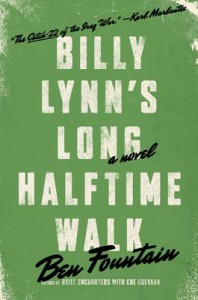In his essay “Confessions of a Book Reviewer,” George Orwell makes the point that one of the rather unfortunate conditions necessary for writing reviews is having to force a spontaneous feeling about a work where one doesn’t exist. The amount of books that you find either truly great or truly awful bears a similar ratio to the number of people in your life who you very strongly love or hate. The overwhelming majority only seem deserving of a shrug and an “all right then.”
Orwell doesn’t mention the opposite problem, coming to a book with a bias already in place. And I don’t mean this in the post-World War II objectivity-doesn’t-actually-exist sense. I’m talking about something a bit more visceral. I’m talking about me, a veteran of the Iraq war, reviewing a novel about the Iraq war.
I have to say, I was skeptical at first. Ben Fountain, the author of Billy Lynn’s Long Halftime Walk, has, as far as I know, never served in the military, much less in combat in Iraq. And while that doesn’t disqualify him from having an interesting and valid opinion, it would be distracting for someone who is writing a novel about the most important event in my life to get the details all wrong.
Also, Ben Fountain is old. In fact, he’s known for being old: Malcolm Gladwell compared him to Cézanne, another late bloomer, in a New Yorker essay in 2008. But it’s not the slow and deliberate progress of a trial-and-error genius that alarms me. It’s that someone who was born before the moon landing dares to tell the greatest untold story of my generation.
This is the baggage I brought to the book. But once I started reading, as the cliché goes, I couldn’t put it down. In a cover blurb, author and Vietnam veteran Karl Marlantes (another Boomer who has monopolized the conversation about war) compares Billy Lynn’s Long Halftime Walk to Joseph Heller’s Catch-22. But I think that’s all wrong. If anything, it should be compared to Norman Mailer’s Why Are We in Vietnam? or Don Delillo’s End Zone.
Instead of Heller’s lampooning of military bureaucracy, these are books that skewer the nightmarish parts of American culture that allow illegitimate wars to be fought in the first place. These books are about the American way of organizing violence: that need to blend technology and spectacle in the most shallow and violent ways possible that has become synonymous with modern warfare itself. And that’s why none of Billy Lynn actually takes place in Iraq. Instead, it takes place in a location more relevant to the causes of the war than Iraq itself: Texas.
On a two-week White House-sanctioned press junket through the heartland culminating in a Thanksgiving Day halftime show at the Dallas Cowboys stadium, Bravo Squad — the heroes of a grim shootout that’s been caught on tape by an embedded Fox (of course) reporter — bumble, embarrass, cry, dry hump, smoke, and laugh their way through the pathetic culture that’s responsible for their profoundly traumatic sense of dislocation and betrayal. There may also be a movie deal in the works about their story, and there’s word that Hillary Swank might be interested in starring.
The characters, even the titular Billy Lynn, are stiff and without a sense of existing outside the plot. But each have their moments of frailty or sweet confusion. It’s just enough that they do their job as placeholders for the kind of people that are in today’s Army: the rich kid running from his decadent family; the guy just trying to get health insurance for his kids; in Billy’s case, the ‘join the Army or go to jail’ trope that has become a cliché because it happens so often.
In other words, today’s Army, especially on the enlisted side, is made up of people who are in some sense outsiders. This isn’t the citizen army, full of future presidents and artists and farmers all coming together to beat the Nazis. It’s a small group of people who have already slipped through the cracks, and then isolated even more by their combat experience. You see this in every awkward encounter with thankful civilians in the book. Like after Billy kisses his new and highly improbably cheerleader girlfriend goodbye before walking to the limo to go to the airport and back to Iraq. Billy is mobbed by a crowd of patriots:
So grateful, they say. So proud. Awesome. Amazing . . . he’s been feeling so superior and smart because of all the things he knows from the war, but forget it, they are the ones in charge, these saps, these innocents, their homeland dream is the dominant force. His reality is their reality’s bitch; what they don’t know is more powerful than all the things he knows, and yet he’s lived what he’s lived and knows what he knows, which means what, something terrible and possibly fatal, he suspects. To learn what you have to learn at the war, to do what you have to do, does this make you the enemy of all that sent you to war?
Ben Fountain’s answer is yes. Through the entire novel Bravo Squad is treated with distance and admiration, reverence and guilt — all the complicated feelings people have towards those who make huge sacrifices on their behalf. The answer is yes when it comes to the multi-billionaire businessmen who want to screw them out of the movie rights to their story. It’s yes in the form of patronizing Texans wearing concealed weapons as if they understand what violence means. It’s yes because of the crumbling families back home, underwater with unpaid medical bills and bunk mortgages. It’s yes because of the cavalier and childishly selfish way strangers ask about the most painful moments of their lives. It’s yes because of the misplaced energies of their youth, the squandered resources, and the hypocrisy that’s so prevalent you almost only notice it when it’s absent.
So despite some pretty flaccid characters, and a few atonal plot points, there were moments in this book that moved me. The general thrust of its argument is, of course, heavy-handed, but in a way that’s too funny not to be disarming. And with so much solipsistic, ego-stroking memoir being written, it’s nice to read a novel that, for lack of a better term, is actually about something. This might not be the best Iraq novel that will ever be written, but it’s the first great one.
This post may contain affiliate links.









